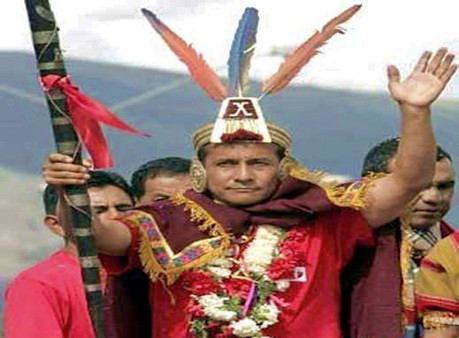
Ollanta Humala campaigning in indigenous dress
Rising above the fear-mongering of the global reactionary Right, Peru's President Ollanda Humala is taking the first concrete steps toward dealing with the devastating impact on indigenous people of Peru's rapid development which is based largely on extraction of it's vast natural resources often located on ancestral lands.
Here's a report from Mongabay:
Peru's new president, Ollanta Humala, has signed into law a measure requiring that indigenous groups are consulted prior to any mining, logging, or oil and gas projects on their land. If properly enforced, the new legislation will give indigenous people free, prior and informed consent (FPIC) over such industrial projects, though the new law does not go so far as to allow local communities a veto over projects. Still, the law puts Peru in line with the Indigenous and Tribal Peoples Convention of 1989, which the South American nation ratified nearly two decades ago.
"What we want to do with this law is have the voice of indigenous people be heard, and have them treated like citizens, not little children who are not consulted about anything," Humala said yesterday. The message seemed a reference to his predecessor, Alan Garcia, who frequently referred to indigenous people as 'confused savages' among other derogatory terms. Garcia had blocked a similar law after it had been passed by Peru's congress.
Recently, Peru has had a troubled history between the federal government and indigenous tribes. Conflict between big oil companies and indigenous people turned violent two years ago when a standoff between indigenous protestors and government police ended with 23 police officers and at least 10 protesters dead, though indigenous people say that bodies of protesters were dumped in rivers to hide the numbers killed. Humala chose to sign the law in the same Amazonian region—Bagua—where the violence occurred.
Recent years have seen unprecedented industrial activity in the Amazon regions of Peru: under Garcia 70 percent of the Peruvian Amazon was handed out to oil and gas companies.
One of Humala's campaign promises was to work to smooth over relations between indigenous people and the government, and he has stated the new law will help mitigate social conflict. Businesses have thrown their support behind the law, given the lack of veto power to local communities and its potential to create better relations between industry and indigenous people.
"We've taken an important step to solving a problem, we're building a republic that respects all its nationalities," Humala declared.
Humala has also promised to keep Peru's breakneck economy—largely driven by mining and gas—going, while expanding benefits to Peru's poor and disenfranchised. He recently slapped higher taxes on mining company profits, though not as high as companies had feared.
While the indigenous organization, AIDESEP, applauded the new legislation prior to the President's signing, it stated that it was only a first step.
"We mustn’t fall into false triumphalism. It is now up to the government to form a national indigenous organization [...] that will uphold strict compliance with this new law," the group said in a statement last month.
The challenge will not be easy. With deforestation and mining for gold (for example) being driven by soaring global prices, there is often little respect for the land or its inhabitants.
Gold mining in Madre de Dios, Peru
The Madre de Dios (Mother of God) district of Peru rises from the lowlands of Acre, Brazil up the east slope of the Andes. Until recently its remoteness alone protected its beauty and biodiversity. What changed, according to Mabel Monfil of Sertãobras was the global surge in gold prices combined with the access afforded by the paving of the new Intercontinental Road.
As development presents its dilemmas, let's hope that Humala is a president who can bring the change that we've been waiting for.






No comments:
Post a Comment